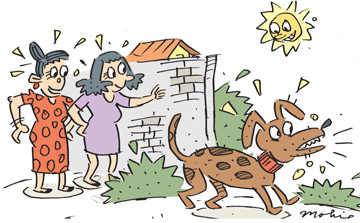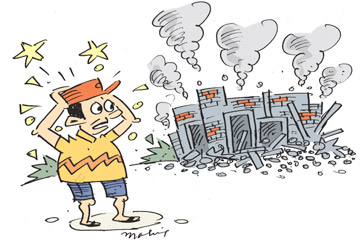|

by R. S. Karunaratne
Relative clauses with ‘whose’
We use a relative clause with ‘whose’ to show that the noun after
‘whose’ is related to the noun before it.
 Deepthi smiled at her uncle whose face lit up. Deepthi smiled at her uncle whose face lit up.
The police raided the house whose occupants were suspected to be
thieves.
The minister praised the artist whose work was on display.
I met a man whose car had broken down.
Ben, whose motorcycle was stolen, was in a bad mood.
A relative clause with ‘whose’ must have a subject and a finite verb.
We have a neighbour whose dog is ferocious. (Singular)
We have neighbours whose dogs are ferocious. (Plural)
The students read Carlyle whose books are interesting.
Mary bought a house whose roof is very low.
The minister will visit an African country whose people are very poor.
Sometimes, ‘whose’ and the noun immediately after it are the object
of the finite verb in the relative clause.
These are the children’s essays whose originality we doubt.
A relative clause with ‘whose’ can be defining or non-defining. A
defining relative clause with ‘whose’ identifies the people or things we
are referring to.
I visited my friend whose house was on fire.
A non-defining relative clause with ‘whose’ does not identify the
people or things we are referring to but only gives more information. We
always put a comma before a non-defining relative clause.
[Activity]
 Fill in the blanks with ‘who, which’ or ‘whose.’ Check your answers
with the key. Fill in the blanks with ‘who, which’ or ‘whose.’ Check your answers
with the key.
1. The man ........... lives next door is an actor.
2. Do you know anyone ........... speaks French?
3. We stayed at the hotel ........... you recommended.
4. Tonight I’m meeting somebody ........... i haven’t seen for ages.
5. We often go to visit our friends in Kandy, ........... is not very
far.
6. Bandu, ............ job involves a lot of travelling, is never at
home.
7. The new auditorium, ............... can accommodate 2,000 people,
will be ready in January 2014.
8. A friend of mine, ............ father is a Police Inspector, helped
me to find my lost purse.
9. The bus strike, .............. began two days ago, is now over.
10. The population of London, ............... was ranked the largest
city in the world, is now falling.
Key:
who 2. who 3. which 4. who 5. which 6. whose 7. which 8. whose 9.
which 10. which
What are homonyms?
Homonyms are words which sound the same but have different meanings
and spellings. Learn the following homonyms with their meanings and
enrich your vocabulary.
1. Miner: one who works in a mine
Minor: somebody under legal age
2. Dual: having two parts
Duel: a fight to settle a dispute
3. Levee: a bank or wall to hold a river back
Levy: to order payment
4. Canvas: coarse cloth
Canvass: to visit to get information
5. Desert: to forsake
Dessert: sweet foods eaten after the meal
6. Affect: to influence
Effect: result
7. Council: a group of advisers
Counsel: advice
8. Waive: to give up a claim
Wave: swell of water
9. Colonel: military officer
Kernel: inside part of a nut
10. Cymbal: musical brass plate
Symbol: something that stands for another thing
11. Callous: unfeeling
Callus: thick place on the skin
12. Principal: school head
Principle: a basic truth
13. Complement: something that completes
Compliment: something good said about somebody
14. Stationary : not moving
Stationery: writing material
15. Bow: bend at the waist
Bow: a weapon
Starters:
How to use prepositions
[Part 17]
There aren’t many prepositions in comparison to the vast number of
nouns, verbs and adjectives in English.
, starters find it difficult to use prepositions correctly in speech
and writing. Here is a guide.
[On]
 If you stand on something, it is underneath you and is supporting
your weight. If you stand on something, it is underneath you and is supporting
your weight.
Pic: The tribal leader stood on a rock and surveyed the area.
I left my books and files on my table.
Students placed a bunch of beautiful flowers on the teacher’s table.
We sat on the grass and sang.
There are two telephones on his table.You can place something on a
surface.
We placed a wreath on his grave.Suddenly, a stranger put his hand on my
shoulder.
If you are on a bus or train, you are travelling in it.
I was on the bus when you telephoned.
As soon as I was on the train, I started reading the newspaper.
A child on the plane started crying before the take-off.
A letter can be written on a piece of paper. Similarly, a news item
can be printed on a newspaper.
The accountant wrote some figures on the ledger.Most children make an
attempt to recognise the words on a page.
You use ‘on’ when part of your body supports your weight.
She was leaning on her elbow.
The beggar was lying on his back.
When you are on a land, you are there.
Jinna was born on an island.
Most women who work on estates are poorly paid.
My father was a tenant on a big farm.
We say that a building is ‘on’ the road, when it is next to the road.
They live on Codrington Avenue.
We rented a house on Main Street.
If something is ‘on’ a vertical surface or ceiling, it is sticking to
it.
My degree certificate is framed and hung on the office room wall.
There is a tube light on the ceiling.
Sometimes, you hurt yourself on something.
Anula fell and hit her head on a stone slab.
Things happen on a particular day.
The club will hold its next meeting on Sunday.
Will you be at home on Saturday?
We play on a musical instrument.
Sandy played Chopin on the piano.
We broadcast news on the radio or television.
We no longer hear our favourite songs on the radio.
The government has banned liquor advertisements on television.
If you live on a particular kind of food, you eat it.
We can’t live on bread alone.
To be continued
Adjectives from nouns
Words often come in families. You can expand your vocabulary by
becoming familiar with these word families. In the following quiz, fill
in column ‘B’ with adjectives for the nouns found in column ‘A’. The
first one has been done for you. Check your answers with the key.
[Column A] [Column B]
1. Impression impressive
2. Improvement ................
3. Increase ................
4. Independence ................
5. Industry ................
6. Infection ................
7. Inflation ................
8. Information ................
9. Injury ................
10. Innocence ................
11. Insistence ................
12. Instance ................
13. Instruction ................
14. Intelligence ................
15. Intention ................
16. Interest ................
17. Interruption ................
18. Introduction ................
19. Invention ................
20. Invitation ................
21. Involvement ................
22. Item ................
23. Journalism ................
24. Judgement ................
25. Juice ................
Key:
2. improved
3. increased
4. independent
5. industrial
6. infectious
7. inflated
8. informed
9. injured
10. innocent
11. insistent
12. instant
13. instructive
14. intelligent
15. intentional
16. interested
17. uninterrupted
18. introductory
19. inventive
20. inviting
21. involved
22. itemized
23. journalistic
24. judgemental
25. juicy |


